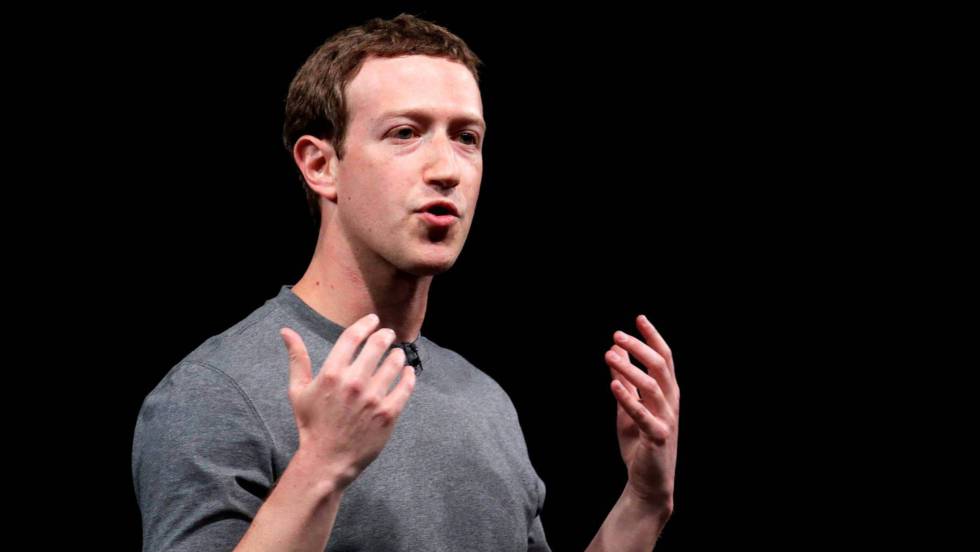The scandal over the mass escape of private data for use electoral opens the biggest crisis in Facebook
Washington
2.100 million users per month. Worth 500,000 million dollars. 25,000 employees. And a historic shake. The scandal of the leak private data for electoral purposes has put Facebook c gainst the ropes. In one week, the company has suffered stock market declines totaling 50,000 million and has seen both sides of the Atlantic rose a gigantic wave of institutional and social discontent. A crisis of confidence, the deepest in its history, to which the company founder, Mark Zuckerberg, was forced to break today its silence. "We made mistakes and we must do more was a gap of trust between Facebook and people who share data and hopes that we protect. we have to fix ".
privacy of users multiply. Washington, Brussels, London and Berlin have demanded official explanations and German Chancellor own, Angela Merkel, today called the "sovereignty of the citizen data" is returned.
In social networks a movement has gained strength under the banner denouncing #DeleteFacebook (#EliminaFacebook) has been supported Whatsapp founder, Brian Acton, whose company bought in 2014 by Zuckerberg 19,000 million. And in the judicial front, different users have filed class action lawsuits in the US and prosecutors' offices in New York and Massachusetts have decided to operate together. To this the investigation opened by the Federal Trade Commission to determine whether citizens' privacy was violated adds.
All this has taken its toll on the giant Menlo Park (California). Trading on Wall Street has gone through one of its worst moments and has been recorded accumulated losses of 12%. But the storm goes far beyond their market value.
In one year, Facebook has been immersed in two explosive scandals. The first came from the Russian interference in the presidential elections of 2016 . The mass poisoning campaign designed by the Kremlin sought, according to US intelligence, dividing public opinion and encourage the election of Donald Trump. To do this, the Russian agents were circulated all kinds of hoaxes. And Facebook was the main highway. Through the company founded by Zuckerberg propaganda reached 126 million people, almost 40% of the US population.
The second outbreak emerged last weekend. An investigation by The New York Times and The Observer revealed the alleged looting of private data of 50 million users of Facebook and their use for electoral purposes by the company Cambridge Analytica, linked to the US extreme right and hired by the campaign team Trump.
They gave him permission, he obtained gross profiles 50 million users. This mass of data passed to Cambridge Analytica and supposedly was the fuel that served the company to develop chips voters and electoral publicity direct them. Kogan said that is considered a scapegoat, and Cambridge Analytica denies having used that information in the presidential campaign.
In this scenario, the pressure on Facebook became unbearable. His first answer did not convince and silence Zuckerberg did nothing but shoot the criticism. Aware of this erosion, the founder of Facebook decided today to answer. He did on your network and a post in which he admitted that they had made mistakes and had to make improvements. "There was a breakdown of trust between Kogan, Cambridge Analytica and Facebook. But there was also a breach of trust between Facebook and the people who share data with us and hoped that we protect. We have to fix it, "he said.
In his letter, Zuckerberg argues that changes were made to limit application access to private information already in 2014. In this regard , recalls that when in 2015, the newspaper The Guardian alerted them that the work of Kogan had been transferred to Cambridge Analytica, its use was banned and asked both to destroy "all data collected improperly" and certificasen him. "And they gave the certificates , " said Zuckerberg. Something similar happened last week. Jumping the scandal, Facebook, according to its founder, he turned back to Cambridge Analytica to prohibit any use of the information. "The company told us that had already destroyed and accepted an audit , " the post.
Although Zuckerberg leaves open whether there was a misuse of the data it does support the breakdown of trust and announces new restrictions on applications and development tools to enable users to control their information. "We have an obligation to protect your data and if we fail then we do not deserve to serve" afirm



